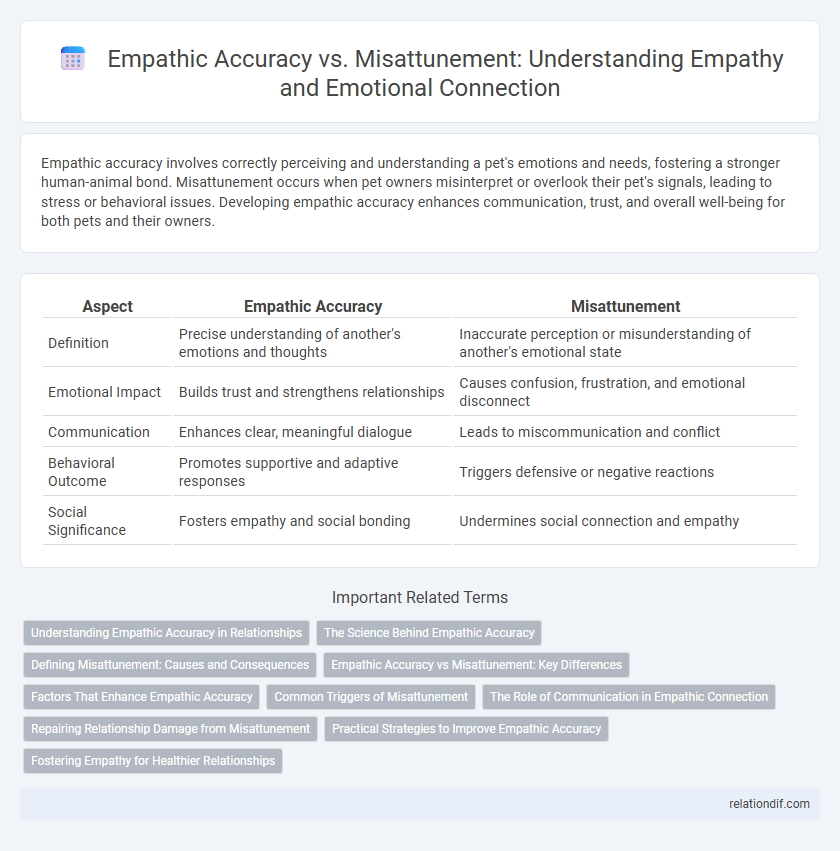Empathic accuracy involves correctly perceiving and understanding a pet's emotions and needs, fostering a stronger human-animal bond. Misattunement occurs when pet owners misinterpret or overlook their pet's signals, leading to stress or behavioral issues. Developing empathic accuracy enhances communication, trust, and overall well-being for both pets and their owners.
Table of Comparison
| Aspect | Empathic Accuracy | Misattunement |
|---|---|---|
| Definition | Precise understanding of another's emotions and thoughts | Inaccurate perception or misunderstanding of another's emotional state |
| Emotional Impact | Builds trust and strengthens relationships | Causes confusion, frustration, and emotional disconnect |
| Communication | Enhances clear, meaningful dialogue | Leads to miscommunication and conflict |
| Behavioral Outcome | Promotes supportive and adaptive responses | Triggers defensive or negative reactions |
| Social Significance | Fosters empathy and social bonding | Undermines social connection and empathy |
Understanding Empathic Accuracy in Relationships
Empathic accuracy refers to the ability to correctly perceive and understand another person's thoughts and feelings, which is crucial for building trust and emotional intimacy in relationships. Misattunement occurs when individuals misinterpret or overlook emotional cues, leading to misunderstandings and conflict. Enhancing empathic accuracy improves communication quality and fosters stronger, more supportive relational bonds.
The Science Behind Empathic Accuracy
Empathic accuracy refers to the ability to precisely infer the thoughts and feelings of others, supported by neural mechanisms involving the mirror neuron system and theory of mind regions such as the medial prefrontal cortex. Research utilizing fMRI and behavioral studies reveals that empathic accuracy enhances social bonding and communication by enabling accurate emotional perception. Conversely, misattunement arises from cognitive biases or impaired neural connectivity, leading to misunderstandings and reduced interpersonal trust.
Defining Misattunement: Causes and Consequences
Misattunement occurs when an individual inaccurately perceives or interprets another person's emotions, often due to cognitive biases, lack of attention, or differing emotional frameworks. This discordance can lead to impaired communication, decreased relational satisfaction, and escalating conflicts. Understanding misattunement's roots in emotional processing deficits and social context misreading is crucial for enhancing empathic accuracy and improving interpersonal connections.
Empathic Accuracy vs Misattunement: Key Differences
Empathic accuracy refers to the ability to correctly perceive and understand another person's thoughts and feelings, enhancing communication and emotional connection. Misattunement occurs when there is a mismatch or misunderstanding in emotional states, leading to confusion and interpersonal tension. Key differences lie in empathic accuracy fostering mutual understanding and emotional resonance, while misattunement disrupts relational harmony and inhibits effective social interaction.
Factors That Enhance Empathic Accuracy
Empathic accuracy is significantly enhanced by factors such as emotional intelligence, active listening skills, and familiarity with the target individual's cultural and personal background. Shared experiences and high levels of trust also improve the ability to accurately interpret others' feelings and intentions. Consistent social interactions and mindfulness practices contribute to reducing misattunement by fostering deeper understanding and emotional resonance.
Common Triggers of Misattunement
Common triggers of empathic misattunement include stress, cognitive overload, and emotional biases that distort perception of others' feelings. Misinterpretations often arise from cultural differences, nonverbal cue mismatches, and personal insecurities, leading to inaccurate assessments of others' emotions. Understanding these triggers enhances empathic accuracy by promoting mindful attention and reducing automatic judgment errors.
The Role of Communication in Empathic Connection
Empathic accuracy hinges on clear, open communication that allows individuals to accurately perceive and interpret others' emotions and intentions, fostering deeper interpersonal understanding. Misattunement arises when communication breakdowns or ambiguous signals lead to misunderstandings, weakening the empathic bond and causing emotional disconnect. Effective communication strategies, such as active listening and reflective feedback, enhance empathic connection by ensuring emotional signals are correctly received and responded to.
Repairing Relationship Damage from Misattunement
Empathic accuracy involves accurately understanding another person's emotions, while misattunement occurs when this understanding fails, leading to relationship strain. Repairing damage from misattunement requires active listening, validating the other person's feelings, and expressing genuine remorse to rebuild trust. Consistent efforts in reestablishing emotional alignment can restore intimacy and strengthen relational bonds.
Practical Strategies to Improve Empathic Accuracy
Empathic accuracy, the ability to accurately perceive others' emotions, can be enhanced through practical strategies such as active listening, maintaining focused attention, and practicing perspective-taking exercises regularly. Reducing misattunement involves checking in with others for feedback, observing nonverbal cues closely, and avoiding assumptions based on stereotypes or personal biases. Developing these skills improves interpersonal communication and strengthens emotional connections in both personal and professional relationships.
Fostering Empathy for Healthier Relationships
Empathic accuracy, the ability to correctly perceive and understand others' emotions, is essential for fostering empathy in healthier relationships, while misattunement, or misunderstanding emotional cues, can lead to conflict and emotional distance. Enhancing empathic accuracy through active listening, perspective-taking, and emotional validation helps build trust and emotional intimacy between partners. Consistent empathy practice reduces misattunement, promoting stronger communication and emotional well-being in interpersonal connections.
Empathic Accuracy vs Misattunement Infographic

 relationdif.com
relationdif.com